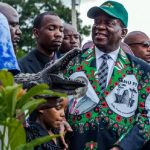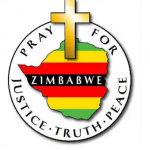 President Emmerson Mnangagwa literally looms large above the bustling streets of Harare: his smiling face beams down from giant billboards all over the city. Zimbabweans are gearing up for critical elections on 30 July, the first in decades not to feature Robert Mugabe and the late Morgan Tsvangirai on the presidential ballot.
President Emmerson Mnangagwa literally looms large above the bustling streets of Harare: his smiling face beams down from giant billboards all over the city. Zimbabweans are gearing up for critical elections on 30 July, the first in decades not to feature Robert Mugabe and the late Morgan Tsvangirai on the presidential ballot.
Can the country conduct peaceful and legitimate elections, and who is most likely to win? After the explosion at a Mnangagwa rally in Bulawayo on 23 June, these questions are especially pertinent.
The mood in Harare is of cautious expectation. Many feel greater freedom to assemble, speak about politics and mobilise for the elections since Mugabe’s ousting in November 2017. Twenty-three presidential candidates registered – up from the usual just two or three – saying as much about fractious opposition politics as about citizens demonstrating their democratic right to stand for office. The formerly ubiquitous bribe-seeking police and Central Intelligence Organisation have dissipated. It is no longer dangerous to point your finger at the president’s office building.
But beneath this veneer of freedom, a deep and lingering distrust of ZANU-PF and the military remains. We heard the saying “the leopard cannot change its spots” several times throughout our visit.
In contrast to past elections, opposition rallies have received media coverage by the state-owned media. Nonetheless, a recent Media Monitors report showed that for every 1 456 seconds dedicated to ZANU-PF coverage on television, just 116 seconds are allocated to the opposition Movement for Democratic Change Alliance.
Opposition parties have raised several concerns regarding the election process. Central to their unease is the independence and integrity of the Zimbabwe Electoral Commission (ZEC). It delayed releasing the voters’ roll – the source of much controversy in previous polls – preventing the verification of its accuracy. The security of the printing and handling of the ballot papers is also a serious concern. In response, ZEC has stuck to the letter of the law, doing little to assure the public of its impartiality, despite legitimacy being so vital in this election.
Some remain unconvinced that the military could accept an opposition win after the November coup last year. ZEC has also been accused of militarisation, with reports of subtle voter intimidation in rural areas by plainclothes military officers. The atmosphere in the countryside contrasts with the capital. Memories of violence and intimidation around previous polls remain fresh there.
“They remember the violence that followed 2008’s run-off,” says Obed Masawure, president of the Amalgamated Rural Teachers Union of Zimbabwe. With a date for a possible run-off mooted for early September, Masawure wonders if ZANU-PF are “capitalising on the fear of the past”. His concerns are contextualised by the increased use of military personnel for administrative election purposes in rural areas – roles previously assigned to teachers.
Continued next page
(161 VIEWS)


